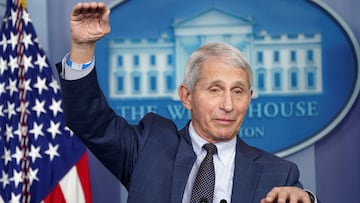Dr. Fauci to step down: How long has he worked at NIAID?
Dr. Anthony Fauci, the nation’s top epidemiologist who helped lead the country throughout the covid-19 crisis will step down this year. How long had he served?

After fifty-four years with National Institute of Allergy and Infectious Diseases (NIAID), severing seven presidents, Dr. Anthony Fauci will step down from his role as director of NIAID. Dr. Fauci has spent his entire medical career at the National Institutes of Health, joining the organization in 1968 after he finished his residency.
In addition to his role as director of NIAID, which he has served in since 1984, Dr. Fauci will also retire from his role as the Chief Medical Advisor to the President in December of this year.
AIDS and the beginning of Dr. Fauci’s career at NIAID
As a reseracher at NIAID in the early 1980s, Dr. Fauci was one of the country’s top scientists researching AIDS. In the mid-to-late 1980s, facing criticism from the gay community as deaths rose rapidly from AIDS, Fauci would go on to agree that the government had not taken the threat as seriously as it should have. During a congressional testimony, he admitted that clinical drug trials moved too slowly, citing low staffing levels at NIAID, and said that if he were an AIDS patient he “would go for what is available on the streets.”
Activists also cited the high prices for drugs that eventually were approved by the FDA, creating an additional barrier to effective and timely treatment.
Fauci took these criticisms and informed the ways in which NIAID would advocate for policy changes to expedite drug trials to ensure easier access to life saving drugs. A parallel track plan where non-approved drugs that had been tested for safety were made available to those who did not make it into clinical trials.
Over the years, Fauci became more known to the US public as he was the face seen when less common diseases began to circulate. The policy surrounding anthrax, Ebola, Zika, were all created with inputs from the NIAID director and the future of the organization is uncertain as history-defining leader departs their halls after more than a half century.
Dr. Fauci and the covid-19 pandemic
While his work on all of these diseases has been noted by US and global leaders, journalists, and health experts, the public got to know Dr. Fauci best throughout the covid-19 pandemic. When many did not trust former-president Trump to inform them on the novel virus, many turned to Dr. Fauci who was, at first, seen as a less political figure.
Sadly, Donald Trump chose to attack Dr. Fauci, leading to him becoming a human representation of business shutdowns and mobility restrictions. For the first time in his career, Dr. Fauci received a security detail after he and his family began to receive death threats.






